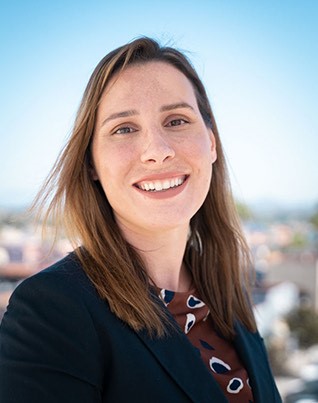USC Price grads help California city electrify vehicle fleet
Students identified ways to electrify Rancho Cucamonga’s fleet to cut emissions, save money, and comply with state climate regulations.

When the California city of Rancho Cucamonga decided to electrify its vehicle fleet, Lindsay McElwain knew who to call.
McElwain, the city’s Management Analyst III for Public Works, contacted her former professors at the USC Price School of Public Policy. Having earned a Master of Public Administration degree online in 2021, McElwain knew first-hand how students work with real clients to solve complex problems for their capstone projects.
“I obviously knew the quality of work that came out of the Price School,” McElwain said. “Our issue at the city was staff capacity, At the time, I said, ‘What if I reached out to my contacts at USC and see if this would be something that they wanted to take on?’”
So began a partnership that gave five recent USC Price School graduates experience working closely with a local government and fire district for their capstone project. The city and fire district, meanwhile, received a report from the students identifying obstacles and best practices to convert roughly 200 gas-powered vehicles into electric vehicles (EVs). That report is now guiding city leaders as they procure EVs to cut emissions, save money on fuel costs and comply with state climate regulations.

“When I started, I thought the major challenge in electrification was purchasing vehicles, however, this project helped me understand more complexities of electrification,” said Haripriya Rachakonda (MPA ‘24), a graduate who worked on the project. “Due to the complexities involved, even with the strong intention and motivation from the city, I learned that electrification is a multi-year project.”
Those complexities include finding trustworthy vendors who build EVs specific to local government and fire district needs; building sufficient charging infrastructure to support the growing vehicle needs over next few years; addressing staff concerns about charging, range of the vehicle and capacity to do specific tasks; and obtaining funding to purchase vehicles.
Perhaps the biggest contribution from the graduates was helping the city decide which vehicles to electrify soon. The student team analyzed the city and fire district’s fleet utilization, assessing whether they have the proper number of vehicles, if vehicles are too often sitting idle, or if any vehicles cost more to maintain than if they were replaced.
“The key thing was identifying the cost of the vehicle,” McElwain said. “They were able to identify the nominal cost per mile of the vehicles for us, and that helped us determine which vehicles we should retire first and replace first.”
A Unique Challenge
By partnering with government and nonprofit organizations, the USC Price School’s capstone projects encourage students to engage directly with decision makers to produce research and recommendations with impact and application, noted Professor Dora Kingsley Vertenten, who oversees the online MPA program. She encouraged other organizations who could use help from graduate students to work with the USC Price School to develop future capstone projects.
“The USC Price MPA program seeks complex problems and analytic opportunities from outside organizations which can provide our students an opportunity for consulting and supporting the client,” she said.
To produce the EV report, students met with stakeholders including the city and fire district fleet managers, as well as leaders from other cities that electrified their fleets. The team also researched electrification case studies to come up with recommended best practices.

Two of Rancho Cucamonga’s electric vehicles. (Photo courtesy of McElwain)
In 2021, the Rancho Cucamonga Council adopted a climate action plan that included electrifying its fleet to cut greenhouse gas emissions. Earlier this year, Rancho Cucamonga, which is about 40 miles east of Los Angeles in San Bernardino County, became one of the first U.S. cities to purchase an EV fire engine.
Still, students found that the city was behind in one area: collecting fleet data. The city and fire district lacked data on things like the routes workers took regularly and whether EV chargers were located along those routes, according to graduate Flora Barron (MPA ‘23). The student team suggested that the city and fire district install software in at least a portion of their fleet to begin gathering such data.

“Cities that are further along in electrification had a lot of this data already, so their plans were informed by those usage patterns,” Barron said. “We outlined how they could use that data to complete an electrification plan based on what’s actually happening day to day with their vehicles.”
In addition to Barron and Rachakonda, the student team included Luis McArthur, Joshua Menchaca and Genevie Martinez. Students said the project was intellectually challenging and provided the kind of experience they expect to see over the course of their careers.
“Evaluating large data sets, speaking with so many different stakeholders, and using methodology to identify what’s important in all those conversations – while also conducting a systematic literature review – was a unique challenge that the program offered. I really enjoyed it,” Barron said.
Learn more about the Master of Public Administration (MPA) online program today.